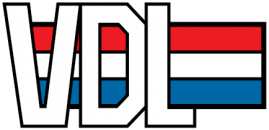VDL is developing electric vehicles for waste collection
VDL Translift in Dronten is developing four electric vehicles, based on the electric drive units designed in collaboration with DAF Trucks, for the collection of waste. In collaboration with public waste collectors HVC, ROVA and Stadsbeheer Rotterdam, the vehicles will be ready for operation later this year. The vehicles have a driving range of around 100 kilometres and will be used for low-noise waste collection in residential areas without emitting hazardous pollutants.
VDL Translift in Dronten is developing four electric vehicles, based on the electric drive units designed in collaboration with DAF Trucks, for the collection of waste. In collaboration with public waste collectors HVC, ROVA and Stadsbeheer Rotterdam, the vehicles will be ready for operation later this year. The vehicles have a driving range of around 100 kilometres and will be used for low-noise waste collection in residential areas without emitting hazardous pollutants.
Emissions
Waste collection accounts for six percent of the CO2 emissions produced by goods transport in Dutch cities. The urbanisation further increases the emissions of carbon dioxide (CO2) and other harmful side effects, such as nitrogen (NOx), particulate matter (PM) and noise (dB (A)) pollution. The collection of household waste goes hand in hand with many transport movements. Relatively short distances are driven in combination with the vehicle continuously standing still and then accelerating again. This leads to inefficient use of conventional diesel engines and consequentially to higher fuel consumption with higher emissions. The major advantage of electric vehicles for waste collection is therefore that no harmful emissions are released into the air and that the vehicles do not generate any noise pollution.
Technology
Initiator and main transporter of the project is VDL Translift, manufacturer of innovative waste collection solutions for (underground) containers in Dronten. “VDL is the European market leader in the field of electrification for heavy transport. The technology we use for the electric collection vehicles is founded on the knowledge and experience that VDL has acquired through the production of electric city buses and the electric truck, combined with the products we make here at VDL Translift", says Mathijs van der Mast, director at VDL Translift. The four electric chassis that are made in preproduction will be constructed to electric collection vehicles by VDL Translift.
Specifications
The electric collection vehicles are built on a 3-axle DAF CF truck chassis with a 28-tonne load weight and a steerable tag axle. The electric motor produces 210 kW of power and 2,000 Nm of torque. The engine receives its electricity from a battery pack with a gross capacity of 170 kWh, offering a driving distance of up to 100 kilometres on one fully charged battery.
Future
Fast-charging stations supplied by VDL will be put into service at the sites of the end users. To make optimal use of the collection routes, charging the electric collection vehicles in between can be done within just half an hour. The first vehicles are expected to be in operation by mid-2019 with the aim of gathering practical knowledge and experience. It is likely that these vehicles will go into production on a larger scale in 2020.
HVC
HVC is responsible for the sustainable waste management of its shareholders (46 municipalities and 6 district water boards in the provinces of North Holland, South Holland, Flevoland and Friesland). HVC undertakes to separate as much waste as possible, so that raw materials can be reused. In addition, HVC produces sustainable energy, which the company then supplies to municipalities, district water boards, companies and private households. HVC also supports measures to become sustainable at a local level. The first electric collection vehicle will be used on the site in Velsen.
ROVA
A public service provider that is responsible for the waste collection in 23 municipalities and for 900,000 inhabitants living in the IJssel-Vecht (Zwolle), Achterhoek (Winterswijk) and Eemland (Amersfoort) regions. The company's main priority is the separated collection of raw material. ROVA will be using the electric collection vehicle at its location in Zwolle.
Rotterdam Stadsbeheer – Roteb Lease
Roteb Lease is a service business unit of Stadsbeheer Rotterdam responsible for collecting waste in the city. Roteb Lease also looks after the entire vehicle fleet of cleaning machinery (approximately 500 vehicles) for several municipalities and government-affiliated companies. Roteb Lease will use the first electric collection vehicle with a crane for underground containers in the city of Rotterdam. This is in line with the ambition to make the municipal vehicle fleet sustainable.

